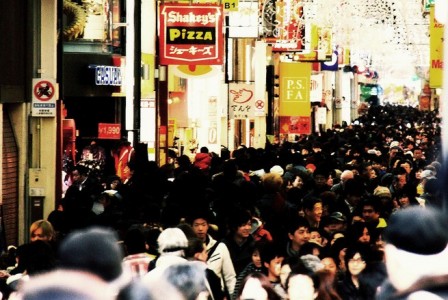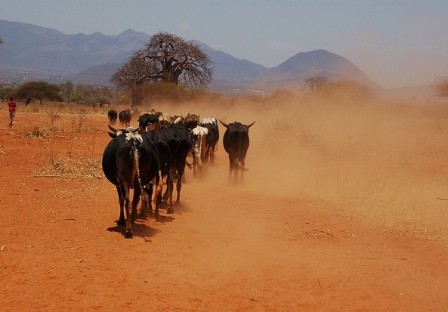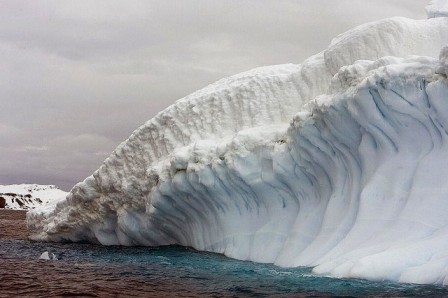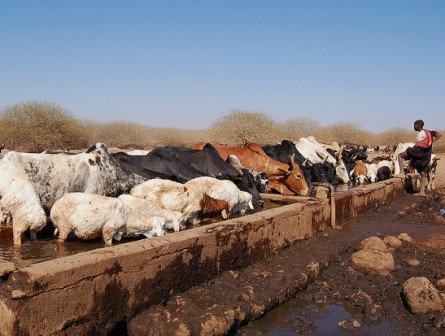Overpopulation, Climate Change, Food Crisis, War: The Horsemen Of Apocalyptic Capitalism

NEWS JUNKIE POST
Mar 7, 2011 at 1:05 amIn the last few years, the prophecies or prognostics of doom and gloom have been coming fast and furious. It is of course the Christian fundamentalist end of days scenario, but it is also featured in other fairy tales or conspiracy theory assumptions such as the predictions of Nostradamus or the Mayan calendar. While the first group is convinced that “Jesus will be back for Judgment Day in their life time”, the second and third groups of believers are putting an exact year on the looming pending cataclysm facing us: it is 2012.
While the notion of a pending apocalypse is impossible to argue rationally, its emotional impact is non-less potent. The horsemen of the apocalypse identified here as overpopulation, climate change, food crisis and war are not symbols like they mythological counterpart. Instead, they are real deep systemic problems that are either man made or that we have collectively failed to tackle due to a global lack of vision and political will. The horsemen, working on the behalf of transnational capitalism, should be identified as the main “clear and present danger” to our survival as a specie, and they are currently joyfully pushing the next generations into the abyss. Despite the evidence piling up most people are still not connecting the dots, yet unless some radical changes are implemented in terms of global governance we are all heading for a very rough ride. If the leviathan that is global imperial capitalism had a voice and a conscience, it would keep on screaming: What have I done?
Overpopulation
The United Nations projects that global population will rise from around 7 billion today to about 10 billion by 2050. Some academics are even more pessimistic and argue that unless birth rates are lowered sharply through voluntary family-planning, which entails easy access to contraceptives, the tally of humans on the planet could reach an unsustainable level of 11 billion by 2050. As an example, every single week the world population increases by one and half million. Naturally, this is a recipe for accentuating the impact of the ecological disaster we have created with climate change.
To make matters worse, the bulk of this exponential population growth will occur in developing countries. This is especially the case in Africa where the population is projected to double from 1 billion today to 2 billion by 2050. For example, the population of Niger, which stands at 11 million today, is expected to reach 50 million in 2050. Niger is a semi-arid country that is already facing the adverse consequences of climate change. In this dual negative context of population explosion and climate change, it is unquestionable that Niger will be unable to feed its population. To put the problem of overpopulation in an historical perspective, in 1800 Earth had a population of about one billion. At the time, British scientist Thomas Malthus gave a dire warning that exponential population growth would inevitably lead to massive food crisis.
One of the reason why the overpopulation issue has been generally ignored for so long is that aggressive population control policies constitute a human rights issue. However, without its coercive one child policy of the Mao Zedong’s era, China would have now an extra 500 million people to feed. The exponential increase in global population is quickly exhausting our limited resources, energy supplies, and is also accelerating pollution leading to global warming. There is no doubt that rapid population growth, especially in developing countries, will lead to hunger, failure in education and conflicts. Unless deep systemic changes are made, this situation will cause mass migration and an increasing numbers of failed states. The current rate of human population explosion, in conjunction with climate change, is clearly unsustainable even in the short term. Both factors will only amplified our already dire food crisis problem.
Climate Change
Man made climate change through global warming is not seriously contested by anyone in the scientific community(unless they are on the payroll of oil companies). The current assessment is even getting more alarming. According to the National Oceanic and Atmospheric Administration (NOAA), climate change is now largely irreversible. The NOAA has established that a significant portion of the carbon dioxide (CO2) emitted by human activities stays in the atmosphere for thousands of years.
If CO2 is allowed to peak at 450-600 parts per million, which is likely to be our doomed course due to a lack of global action, the results would include dramatic increase in extreme weather, such as floods and hurricanes, and persistent decreases in dry-season rainfall. This phenomenon will be comparable to the 1930s North American Dust Bowl drought, but it would be much wider to include southern Europe, northern Africa, southwestern North America and western Australia. The impacts would differ by regions, but they would include a decrease in water supplies, an increase in fire frequency, an expansion of deserts, and other drastic ecosystem changes. Dry season wheat and maize agriculture in regions of rain-fed farming, such as Africa, would also be dramatically affected. This factor, combined with overpopulation will only compound the global food crisis.
The other critical issue coming with climate change is a global rise of sea level. Considering just the expansion of warming ocean waters- without even adding melting glaciers and polar ice sheets- the irreversible global sea level rise by the year 2100 would be at least 1.3 feet and up to 2.5 feet. Of course, if the melting of glaciers and polar ice is taking into consideration it would increase the overall rise to between 2.5 feet to 4.00 feet. Such a rising of sea levels would submerge coastal areas and islands providing habitat for more than 1.5 billion people globally.
Food Crisis And War
Rising food prices are here to stay. In February, the world food price index tracked by the United Nations rose to a record high. In addition recent rising oil prices due to the uncertainty in the Middle-East will increase the cost of global food production and transport. In order to feed a growing world population, the global food output will have to climb by 70 percent by 2050. This is according to the UN’s Food and Agriculture Organization (FAO). Rising food prices were the initial trigger for the uprisings and revolutions across North Africa and the Middle-East which toppled Ben Ali in Tunisia and Mubarak in Egypt.
World financial markets have also a negative impact on food prices as investors are pouring money into the commodity market. For example, wheat prices jumped 65 percent in the past year after droughts and fires in Russia and Eastern Europe prompted these countries to restrict the volume of their exports. Dry weather curbed corn output in the United States while rising demands for livestock and ethanol put an additional pressure on the crop’s price. Flood in China, India and Pakistan also impacted and restricted rice supplies. The three examples above illustrate the incredible negative impact of climate change on the security of our food supplies. According to the USDA, global inventories for all grains will drop by 13 percent before the next harvest. It is the first decline since 2007, and surging food prices the following year triggered more than 60 riots worldwide from Haiti to Egypt.
The cost of direct US military operations-not even including long-term cost such as medical care for wounded veterans- since the invasion of Afghanistan in 2001 and Iraq in 2003 stands at around 5 trillion. And while this staggering amount can be directly linked to the global financial meltdown of 2008, most Americans are still refusing to connect the dots between two wars charged on our national credit card and the financial crash. The cost of the two wars has been financed almost entirely by borrowing. Neither the Bush administration nor the Obama administration have raised taxes to pay for the wars, and as matter of fact both US administration have lowered taxes on the rich. The austerity measures currently promoted by both Republicans and Democrats are directly connected to this insane war spending. America is broke because Americans let their elected officials charged two very expensive wars on our credit card. Despite this, this part of the US budget will not be cut. People must understand that we can’t have both bread and guns, and that the cost of wars are real even if the bulk of the burden will be deferred to future generation.
A few days ago, the US ambassador at the UN Susan Rice called Gaddafi “delusional”. Again tonight, Senator McCain said that Libya’s dictator was “insane”. It would be hard to refute their argument, but one can easily say that the system of transnational capitalism muscled by the US military is also not reality based. The United States is still not acting on climate change, overpopulation is barely on the radar, and military spending keeps on rising with no end in sight. Meanwhile, the masses in North Africa and the Middle-East want to set their own destiny, and are re-defining the geopolitical landscape. This movement, if it blooms, could be the catalyst for fundamental changes where human kind unite to seek better governance on a global scale to tackle the real problems of our time such as climate change and overpopulation. The for-profit-for-the-few system of imperial transnational capitalism has failed, its true face is apocalyptic, and we are getting closer to the end game.
Related Articles
- March 27, 2011 Is A Just And Sustainable Global Governance Possible?
- February 16, 2011 US Foreign And Budget Policies: Putting Bandages On The Titanic
- January 24, 2011 Tunisia, WikiLeaks And Food Crisis: Forces For A Global Revolution
- January 29, 2012 Has Occupy Forgotten Why?
- August 22, 2021 Forget Wars on Covid and Terror: War on Climate Collapse Is the Only War of Necessity for Human Survival
- February 13, 2011 Global Revolution: Will the Many Finally Triumph Over the Few?





















8 Responses to Overpopulation, Climate Change, Food Crisis, War: The Horsemen Of Apocalyptic Capitalism
You must be logged in to post a comment Login